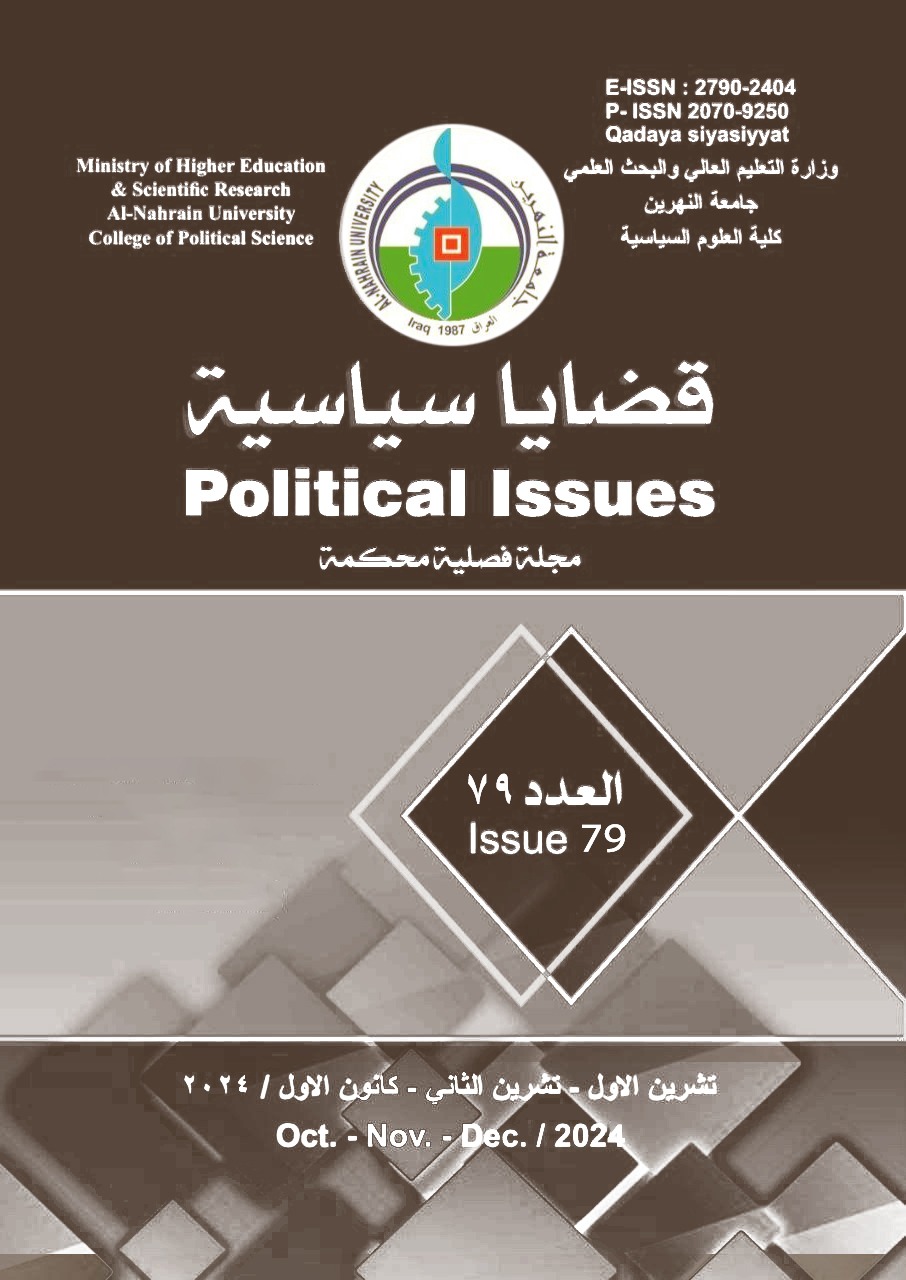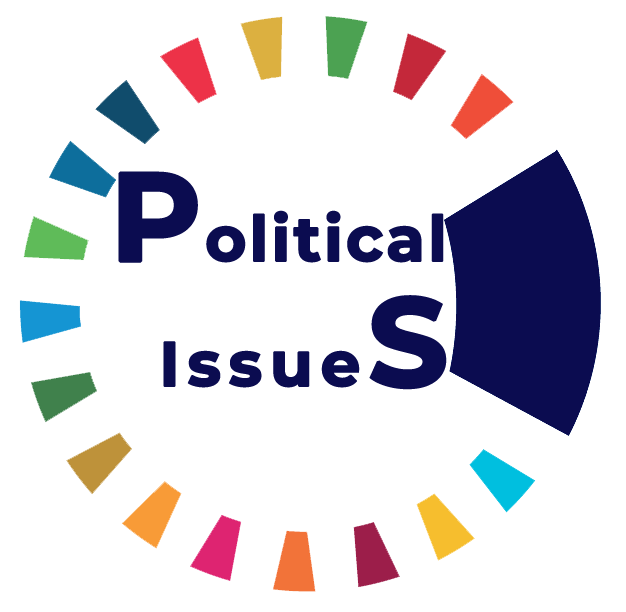The role of the state in democratic transformation :Iraq after 2003 as a model
DOI:
https://doi.org/10.58298/792024603Keywords:
The state, democratic transformation, freedom , citizenshipAbstract
Democracy is a process of social and civilizational growth to which countries that try to build their reality rise to it in a sound structure within clear foundations through which the people are given the right to choose the form of the political system that provides an appropriate ground on which to base it and gives them the ability to closely interrelate the components of society . The roots of democracy in Iraq extend to the beginning of The monarchy in 1921 , but there were many military coups that took place and the regime turned into a republic in which any form of democracy was absent .That period ended with a transformation that took place through external military intervention . You cannot consider it natural growth , because there was an external will that imposed the decision with the conviction that there was a will .An internal patriotism seeking a new transformation has interfered with external will that imposed itself on reality , and as a result it is tainted with many problems for which solutions must be found and adherence to the principles of the democratic system in order to achieve a sound democratic transformation
References
Ahmed Zaki Badawi, Dictionary of Social Terms, Beirut, Lebanon Library, 1982.
Ihsan Muhammad al-Hasan, Encyclopedia of Sociology, Beirut, Arab Encyclopedia House, 1999.
Jamil Saliba, Philosophical Dictionary, Beirut, Lebanese Book House, Vol. 2, 1982.
Nazim Abdul Wahid al-Jasour, Encyclopedia of Political, Philosophical and International Terms, Beirut, Arab Renaissance House, 2008.
Eric Brandt, Introduction to Constitutional Law, translated by: Muhammad Thamer, Baghdad, Al-Sanhouri Library, 2012.
Burhan Ghalioun, Criticism of Politics: State and Religion, Casablanca, Arab Cultural Center, 2011.
Charles Tilly, Democracy, translated by: Muhammad Fadel Tabakh, Beirut, Arab Organization for Translation, 2010.
John Rawls, The Law of Nations and the Return to the Idea of Public Reason, translated by: Muhammad Khalil, Cairo, Supreme Council for Culture, 2007.
Joseph Stride, The Medieval Origins of the Modern State, translated by: Muhammad Itani, Beirut, Dar Al Tanweer, 1982.
Hassanein Tawfiq Ibrahim, Arab Political Systems: Modern Trends in Their Study, Beirut, Center for Arab Unity Studies, 2005.
Raad Naji Al-Jaddah and others, Human and Child Rights and Democracy, Baghdad, Ministry of Higher Education and Scientific Research, 2001.
Robert McIver, The Formation of the State, translated by: Hassan Saab, Beirut, Dar Al-Ilm Lil-Malayin, 1996.
Suleiman Abdel Moneim, The State in Crisis and the Confused Society, Beirut, Arab House for Science Publishers, 2012.
Abdel-Ilah Belqaziz, The State in Contemporary Islamic Thought, Beirut, Center for Arab Unity Studies, 2nd ed., 2004.
Abdel-Ilah Belqaziz, The State and Legitimate Authority, Beirut, Knowledge Forum, 2013.
Abdel-Wahhab Hamid Rashid, Democratic Transformation in Iraq, Beirut, Center for Arab Unity Studies, 2013.
Abdel-Wahhab El-Afandy, Political Culture and the Crisis of Democracy in the Arab World, a group of authors, Interpretation of the Democratic Deficit in the Arab World, Beirut, Center for Arab Unity Studies, 2011.
Abdel-Hamid Ismail Al-Ansari, Shura and Its Impact on Democracy, Beirut, Modern Library Publications, 1998.
Azmi Bishara, On the Arab Question: Introduction to an Arab Democratic Statement, Beirut, Center for Arab Unity Studies, 2007.
Ali Al-Wardi, Social Glimpses from the History of Modern Iraq, London, Kofan House, 1992.
Ali Khalifa Al-Kuwari, The Concept of Contemporary Democracy, a group of authors, The Democratic Issue in the Arab Homeland, Beirut, Arab Unity Studies Center, 2nd ed., 2002.
Muhammad Abed Al-Jabri, Democracy and Human Rights, Beirut, Arab Unity Studies Center, 2nd ed., 1997.
Muhammad Abed Al-Jabri, Contemporary Thought Issues, Beirut, Arab Unity Studies Center, 1997.
Muhammad Abed Al-Jabri, The Arab Political Mind: Its Determinants and Manifestations, Beirut, Arab Unity Studies Center, 4th ed., 2000.
Muhammad Jaber Al-Ansari, The Political Formation of Arabs and the Meaning of the State of Qatar, Beirut, Center for Arab Unity Studies, 1994.
Muhammad Thamer, Human Rights: General Principles and Origins, Baghdad, Al-Sanhouri Library, 2012.
Muhannad Saleh Al-Tarawneh, The Relationship between the Executive and Legislative Authorities in the Parliamentary System, Amman, Dar Al-Warraq for Publishing and Distribution, 2009.
Munther Al-Shawi, The Philosophy of the State, Baghdad, Al-Dhakira for Publishing and Distribution, 2013.
Nizar Tawfiq Hasso, The Struggle for Power in Royal Iraq, Baghdad, Al-Kindi Library, 1984.
Hani Ali Al-Tahrawi, Political Systems and Constitutional Law, Amman, Dar Al-Thaqafa for Publishing and Distribution, 2007.
Walid Shahib Al-Hilli and others, Education on Human Rights, Baghdad, Iraq Institute for Strategic and Future Studies, Al-Ahmad Press, 2007.
Saba Hamid Saleh Al-Tamimi, The Problematic Relationship between Citizenship and Change in Arab Countries: Egypt as a Model, Master’s Thesis, Faculty of Political Science, Al-Mustansiriya University, 2016.
Mahmoud Salim Hashem Shobaki, Ennahda Movement Policies and Their Impact on Democratic Transition in Tunisia (2010-2015), Master’s Thesis, College of Graduate Studies, An-Najah National University, Palestine, 2016.
Mustafa Balour, Democratic Transformation in Arab Political Systems: A Case Study of the Algerian Political System, PhD Thesis, Faculty of Political Science and Media, University of Algiers, 2010.
Mina Ishaq Boulos, Democratic Transformation and Change in Foreign Policy: A Study of South Korea’s Policy towards North Korea during the Period (1986 to 2007), Master’s Thesis, Faculty of Economics and Political Science, Cairo University, 2012.
Jamal Muhammad Salim, The Dilemma of Choice: The Four Models of the Modern State: Theoretical Trends, International Politics Magazine, Issue 189, Volume 47, 2012.
Hamid Nafl Al-Nadawi, The Culture of Tolerance and the Dialectic of the Relationship between the Self and the Other, Political and International Magazine, College of Political Science, Al-Mustansiriya University, Issue 8, 2008.
Riyadh Aziz Hadi, The Concept of the State and Its Emergence in Ibn Khaldun, Journal of the College of Political Science, University of Baghdad, Issue 37, 2008.
Saad Hamid Ibrahim, Prospects for Strengthening Cooperation between Civil Society and Democracy in Iraq, Political and International Magazine, College of Political Science, Al-Mustansiriya University, Issue 8, 2008.
Amer Hassan Fayyad, Strengthening Iraqi National Unity between Federalism and Centralism and Amending the Constitution, Political and International Magazine, College of Political Science, Al-Mustansiriya University, Issue 8, 2008.
6Abdul Wahab Mahmoud Al-Masry, Shura, Democracy and the Relationship between Them, Political Thought Magazine, Damascus, Arab Writers Union, Issue 2. 42. Hans von Sputnik, After the War and Before the Peace: Where is Iraq Going?, Al-Mustaqbal Magazine, Beirut, Arab Unity Studies Center,
Additional Files
Published
Issue
Section
License
Copyright (c) 2024 حميد نفل النداوي، صبا حميد التميمي

This work is licensed under a Creative Commons Attribution 4.0 International License.
This is an Open Access article distributed under the terms of the creative commons attribution (CC BY) 4.0 international license which permits unrestricted use, distribution, and reproduction in any medium or format, and to alter, transform, or build upon the material, including for commercial use, providing the original author is credited.






